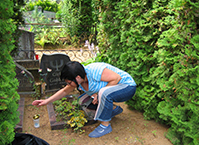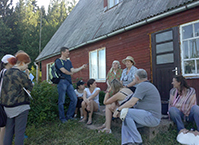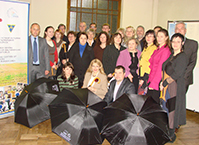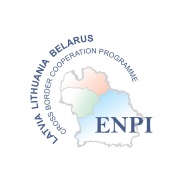A person and authorities
Categories: Man and authority, Ira Motolyga
So, there started such persecutions, my mother told me that she was dating with a boy from Poland who was implicated in something. So before the very graduation from the institute, we were already taking exams, the officers of Committee for State Security came in and took away half of our group. I have already passed the exam and they called me, too. Mother told me that she was called but the investigator was good and he told her. Mother said that when they studied in Moscow, and when she did well they were given personal rooms in the dormitory, so she had a separate room in the dormitory. Besides, she told me that at that time they were taking exams not every person for himself, but they studied in groups, then one person from a group was called, nobody knew who would it be and one took an exam. And other people in the group had the same mark. Everybody studied, my mother did very well, all wanted her to be called in order to get a five-mark.
How many languages did your mother know?
My mom? I don’t know. Mother knew Polish well, she could read and write well. When she was asked to go to Israel. She knew German well, very well. She was smart. But at the same time my mother was afraid of everything. He told her then that she had an assignment, she was appointed as a chair of village council in Zembino near Borisov. And that investigator told her in Moscow, «Go away, rather far off and do not do administrative work. Withdraw into the shadows». My mother told me his surname, she told me about that. I do not remember well. I didn’t listen to her well. His surname was Medvedev, the investigator’s surname. And my mother said that one her friend who worked in Borisov came from Moscow. My mother said that she worked in the region, in Zembino, and he worked in Borisov. And I came to the meeting in Borisov and he whispered me, «Basya, you need to leave somehow, there are not our friends here». Mother told me she didn’t believe. In Zembino my father ran after my mother. He led down military installations and he had to leave for Belostok. My mother told me that she surrendered her documents, everything, and everything and moved away. She said that when living in Belostok she looked through the window, she already gave birth to children and was afraid of a «black crow» that would come and take her. That is why she worte everywhere that she had no higher education, didn’t speak any languages except Belarusian. My mother never owned up to anything.
Do you remember the death of Stalin?
Yes, I remember. We were going to school. They put us in a line.
How did you learn that Stalin had died?
The teachers came to school, I remember there just TV appeared, I remember when Stalin died, I remember that day. They made us stand in a line. All of us were in school uniforms. All were in such a mourning. We were told to wear black aprons, we wore black bows. We were told that Stalin died and all started to cry. But I couldn’t. I have always remembered this situation. I was very cheerful by nature. I took everything easy. I couldn’t make myself crying, and I made false tears quietly. I thought they would be swearing at me, they would kick me out, but I couldn’t cry anyhow. I remember that very well.
And how did your family take it up?
My grandmother, our mother never told us anything, but our grandmother was such a Stalinist, she had Stalin’s portrait cut out of the newspaper. She was told that the Jews were saved only by Stalin. All of them were burned in ghetto. And so he and she, well, there was Stalin’s portrait under the pillow.
And did your mother feel safer after Stalin’s death?
Yes, she was called to Moscow, we went there all together, she took us to Moscow, she went to Kreml, my sister and me were sitting on the bench and waiting her. And she was rehabilitated. But after that she didn’t go to work, no, she didn’t go anywhere. She said that her life had already passed and she didn’t want this.
Did she hold a grudge at the Soviet system? What was her attitude to the Soviet system?
You see, she was very... if you could see her and talk to her you would think that you spoke to such a great person. She was very quiet and intelligent woman by nature. She knew everything, she could explain everything. I was just so inattentive, I didn’t ask her, she could tell me about everything, about cinema, ballet. She could show me everything, one could just have a good school, I understand it now. At that time I didn’t want to listen for that. Were you concerned yourself with politics in general? What was going on in the country? There was no politics, I even wasn’t interested in. First of all, when we heard that they were taking black kids from Italy or something like that. We, my sister and me, used to say, «Oh, it’s luck that we were born here, we won’t be taken anywhere». We always said that. And later when I had grown up, I wasn’t interested in politics at all. We only thought about going to school, going to disco or to the cinema…
Images
Audio
Researcher: Наталья Иващенко, кандидат исторических наук, ГрГУ им. Я. Купалы, Светлана Силова, кандидат исторических наук, доцент, ГрГУ им. Я. Купалы











